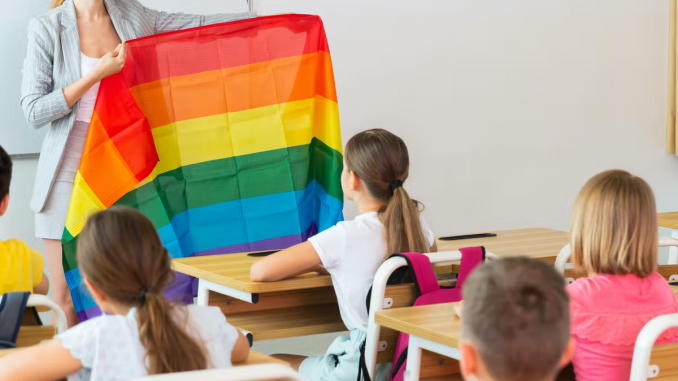
A Florida bill that would forbid discussions about gender identity and sexual orientation in schools advanced in the Florida House of Representatives on Feb. 22. The bill titled The Parental Rights in Education Bill, also dubbed the “Don’t Say Gay” bill, set for a final vote on Feb. 24 after Republican lawmakers refused multiple Democratic amendments to the bill.
The bill states, “Classroom instruction by school personnel or third parties on sexual orientation or gender identity may not occur in kindergarten through grade 3 or in a manner that is not age-appropriate or developmentally appropriate for students in accordance with state standards.” Parents would be allowed to sue school districts for violations.
LGBTQ+ advocates expressed concern that the bill will act as a complete ban on lessons about LGBTQ+ oppressions, discussions and history regarding LGBTQ+ identities. It is not clear what kinds of discussions the bill would prohibit, but critics of the bill have stated that the language of the bill is broad, which could lead to potential lawsuits from parents who believe any conversation violates the legislation.
The bill’s sponsor, Republican Rep. Joe Harding, maintains that the bill is meant to prevent a school district from integrating topics regarding sexual orientation or gender identity into curriculum, rather than stop spontaneous discussions about the topics.
Democratic Rep. Carlos Guillermo Smith, who identifies as gay, chastised the bill for framing LGBTQ+ people and topics as taboo; “what topics specifically about people like myself, LGBTQ Floridians, are not appropriate to teach in the classroom? Is it topics about how LGBTQ people love one another? Is it topics about our marriages, which are legal in the United States and Florida, is it conversations about our families, or is it conversations about sexual activity?” He asked.
State bills targeting the LGBTQ+ community have increased. Freedom for All Americans, a nonprofit organization that advocates for LGBTQ protections, found that conservative state lawmakers filed more than 170 anti-LGBTQ bills since the start of 2022. This amount already surpasses the total number of 131 anti-LGBTQ bills passed in 2021. At least 69 of the bills filed so far this year are centered on school policies.
The bill has received support from Florida’s Gov. Ron DeSantis, who said it is “entirely inappropriate” for teachers to discuss students’ gender identity without parental involvement.
Conservatives argue that LGBTQ issues don’t belong in school because they are “political” and “not age appropriate” for students. LGBTQ youth and their allies disagree, and argue that they feel they are being “erased” from the U.S. education system.
Nicolette Solomon, a fourth grade teacher in Miami-Dade County who identifies as a lesbian, stated she is already hesitant to mention that she has a wife at school, but if the bill were to become law, it would be “the straw that breaks the camel’s back,” and she would quit her job as a teacher.
“If I can’t be myself, seven hours a day, five days a week, then I’m going back in the closet, and I can’t do that. It’s not good for my own mental health,” she said. “And I don’t think I can bear to see the students struggle and want to ask me about these things and then have to deny them that knowledge. That’s not who I am as a teacher.”
“It upsets me that the bill advanced in the house or that this bill was even created, because talk about sexual orientation and gender identity is normal and should be normalized. Suppressing talks like these can negatively affect people both emotionally and mentally. Growing up, so many people only hear the talk of sexual orientation and gender identity in school, if topics like that aren’t brought up at home. Taking away free-speech about these things from school is a complete step in the wrong direction,” said Theresa Fiscaletti, first-year Early Childhood Education major.
“The kids who don’t get exposed to it at home, will get little to no exposure to this normal everyday topic. It worries me that it will create a closed minded group of people. Aside from that, people deserve to share their feelings if they feel they are in a safe space. The fact that this feeling could be ripped away from them also worries me. Many people may also stay closeted because of their parents’ reactions, which can be very mentally draining and force one to not feel as they can be themselves. I hope this bill can be stopped,” added Fiscaletti.

